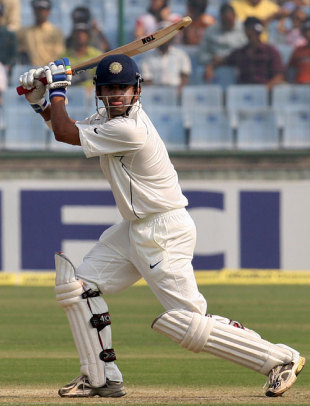|
|
|

Gautam Gambhir had scored a double-century in Delhi
© AFP
|
|
| |
The Indian board appears to be heading for a confrontation with the ICC over the one-Test ban on Gautam Gambhir. While the BCCI has rejected the decision of the appeals commissioner, Justice Albie Sachs, to uphold the ban, and issued a strongly worded protest, the ICC has said the "matter is closed".
"The ICC Code of Conduct is a robust and independent process designed to achieve a fair and proper outcome," Haroon Lorgat, the ICC's chief executive, said. "Although we have received an objection letter from the BCCI, there is nothing more that we can do as the appeal commissioner's decision is a final and binding decision."
The BCCI, in a statement, said the order "seems to have been pre-decided" as it had been passed without affording the player an opportunity of personal hearing and legal representation, without acceding to his request for certain documents/recordings to be given to him and also denying him an extension of time.
The selectors have, however, called up Tamil Nadu's M Vijay as a replacement for Gambhir for the fourth Test against Australia, which begins on Thursday. Gambhir has been the leading run-getter in the series so far, with 463 runs in three Tests including a century and a double-century.
In its letter to the ICC, written by board secretary N Srinivasan, the BCCI said the order was void as being in violation of the mandatory provisions of the rules and/or the principles of natural justice. However, the ICC Code of Conduct - for players and officials for matches other than the World Cup, Champions Trophy and Under-19 World Cup - says the "decision of the appeals commissioner shall be final and binding". It gives the commissioner absolute authority in such situations, including the right to decide whether oral representations should be permitted.
"Oral representations (either in person or by telephone conference as determined in the discretion of the appeals commissioner) should be permitted unless there are good reasons for relying on written submissions only", the rules state. "Where it is available, he shall view video tape of the incident which is the subject matter of the appeal."
Earlier, the ICC rules - which were changed in 2007 - provided for a dispute resolution committee to handle such protests, a provision that BCCI utilised in 2005 when a six-ODI ban on Sourav Ganguly, the then India captain, for slow over-rates during an ODI series against Pakistan was reduced to a four-match penalty. Ironically, in that case, it was Justice Sachs who overturned the adjudicator's decision to uphold the ban by Chris Broad, the then match referee.
Gambhir was banned for one Test by Broad after he pleaded guilty to a charge of not conducting play "within the spirit of the game as well as within the laws of cricket" during the third Test against Australia in Delhi, a Level 2 offence under the ICC Code of Conduct. The incident that led to the ban occurred in the 51st over of India's first innings on the first day, when Gambhir, who had verbal altercations with Shane Watson, appeared to elbow the bowler during a run. He was told of his ban before the third day's play after which he filed an appeal.
When making his decision, Broad took into account Gambhir's previous fine for running into Pakistan's Shahid Afridi during an ODI in Kanpur last year. He had been fined 65% of the match fee after he was found guilty of a Level 2 charge of inappropriate and deliberate physical contact between players as well as a Level 1 charge of not conducting himself within the spirit of the game.
Justice Sachs, Cricket South Africa's representative on the ICC Code of Conduct Commission, is a senior judge on the Constitutional Court of South Africa.

